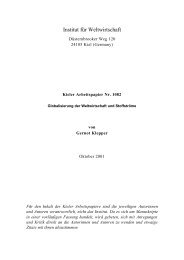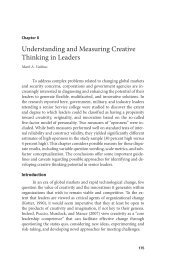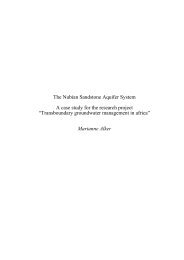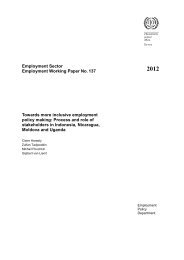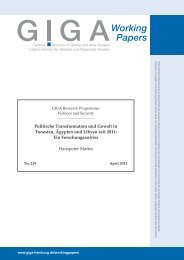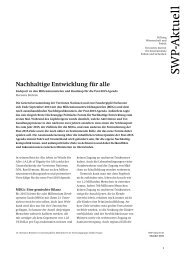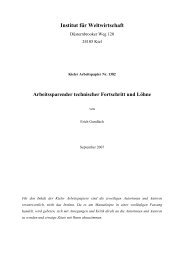Authoritarian Rule and Democracy in Africa: A Theoretical Discourse
Authoritarian Rule and Democracy in Africa: A Theoretical Discourse
Authoritarian Rule and Democracy in Africa: A Theoretical Discourse
You also want an ePaper? Increase the reach of your titles
YUMPU automatically turns print PDFs into web optimized ePapers that Google loves.
the diplomatic service <strong>and</strong> appo<strong>in</strong>ted to head parastatal organizations. They also sit on thecouncils <strong>and</strong> boards of educational establishments <strong>and</strong> social service <strong>in</strong>stitutions.It is not surpris<strong>in</strong>g that several Nigerian scholars <strong>and</strong> politicians see the military as a brute factof life – an alternative political party to the civilians. 4 Ideas of a civil-military diarchy haveeven been advocated by prom<strong>in</strong>ent politicians <strong>and</strong> bus<strong>in</strong>ess groups as a framework forpolitical stability (Ibrahim, 1986; Bangura, 1986). Popular consciousness questions, however,the expansive presence of the military <strong>in</strong> civic life. Conflicts have erupted between civilians<strong>and</strong> military personnel, result<strong>in</strong>g, <strong>in</strong> several cases, <strong>in</strong> considerable loss of life <strong>and</strong> the violationof legal procedures <strong>and</strong> civil liberties. (Newswatch, 1989a).Democratization has been coloured with strong authoritarian practices. Elected local councilchairmen have either been dismissed, 5 or not sworn <strong>in</strong> by military governors even when thecouncillors get favourable verdicts from the courts. 6 Other acts of <strong>in</strong>discretion <strong>in</strong>clude thearbitrary dissolution of all the local government councils before their full tenure <strong>and</strong> theappo<strong>in</strong>tment of sole adm<strong>in</strong>istrators to run the councils; the creation of a military consultativecouncil to co-exist with the evolv<strong>in</strong>g representative civil <strong>in</strong>stitutions; <strong>and</strong> the anomaloussituation where the federal military government would have to supervise elected state <strong>and</strong>local governments between 1990 <strong>and</strong> 1992.Why is the military <strong>in</strong>terested <strong>in</strong> democratization if it cannot tolerate liberal democraticpractices <strong>and</strong> the rule of law? And what are the implications of the authoritarian conduct ofthe military for the democratization project? F<strong>in</strong>er has developed a model that seeks toexpla<strong>in</strong> why the military <strong>in</strong>stitutionalizes or abdicates power. He constructs a matrix ofseveral variables which are related to two summary variables, viz. “dispositions” <strong>and</strong> “societalconditions”, which <strong>in</strong> turn are related to “motivations” <strong>and</strong> “necessary conditions”. Thevariables on dispositions <strong>in</strong>clude belief <strong>in</strong> civilian supremacy, threat to the cohesiveness of themilitary, lack of self-confidence, <strong>in</strong>ternal consensus to withdraw from power, <strong>and</strong> adequateprotection of corporate <strong>in</strong>terests. The last two are seen as necessary conditions, while theothers are strictly motivational. The societal conditions <strong>in</strong>clude <strong>in</strong>ternal challenges, externalfactors, <strong>and</strong> the availability of a civilian organization to h<strong>and</strong> over power to. The first two aremotivational <strong>and</strong> the last is a necessary condition (F<strong>in</strong>er, 1985).Despite the <strong>in</strong>sights it offers, the model does not fit the Nigerian case. Even though themilitary is highly visible <strong>in</strong> most public <strong>in</strong>stitutions, the leadership has not ab<strong>and</strong>oned its“stratocratic” character 7 to rule through a civilian cab<strong>in</strong>et, a party <strong>and</strong> a legislature. Nor is theprogrammed retreat to the barracks a result of the military’s belief <strong>in</strong> civilian supremacy, thethreat to the <strong>in</strong>ternal coherence of the military, 8 or its lack of self-confidence. The military’scontempt of “bloody civilians” is deep-rooted. Its belief <strong>in</strong> its capacity to rule has not been4 The former president of the Second Republic, Shehu Shagari, was among the first group of politiciansto argue that the only two political parties <strong>in</strong> Nigeria are the military <strong>and</strong> the civilians. Some Left<strong>in</strong>tellectuals see sections of the military as capable of provid<strong>in</strong>g a vanguard for revolutionary change.For a review see Beckman (1986).5 The chairman of the Enugu local government council was removed from office <strong>in</strong> September 1988for his “actions, utterances <strong>and</strong> activities”.6 The Nigerian Bar Association ordered its members to boycott all courts <strong>in</strong> the country for a few daysto protest the refusal of the Gongola state governor to respect the rul<strong>in</strong>g that had upheld the petition oftwo c<strong>and</strong>idates for the posts of two local government areas <strong>in</strong> the state.7 Some of the features of <strong>in</strong>stitutionalization can, however, be recognized. Babangida is the firstmilitary leader to declare himself president; the first to dismiss his second <strong>in</strong> comm<strong>and</strong>; <strong>and</strong> the first todissolve the entire Armed Forces Rul<strong>in</strong>g Council; he also makes use of civil patronage to co-opt <strong>and</strong>neutralize opponents. The press calls him the “Maradona” of Nigerian politics.8 The decision to democratize came before the abortive military putsch of April 1990. The putschcerta<strong>in</strong>ly re<strong>in</strong>forced calls for the speedy implementation of the transition programme.23






